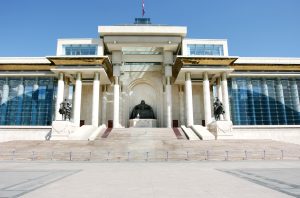In May 2023, the parliament of Mongolia passed a constitutional reform that – among other things – enlarged its legislative branch from 76 members to 126. With the first post-reform parliamentary election coming up this June, political parties have opportunities to enhance civic engagement, include more women, and encourage youth participation in the political life of Mongolia.
With the enlargement of its legislative body, Mongolia has a chance to give more opportunities for women. As the parliamentary election approaches, parties need to do more to inform and engage with youth, women, and the groups that are often neglected by politicians.
Major political parties such as Democratic Party and Mongolian People’s Party, which have traditionally dominated Mongolian politics, as well as smaller parties like the Khun Party have already been actively engaging youth. Mongolian youth are not idle in political matters, either. Between 2022 and 2023, Mongolia had multiple rounds of protests, in which participants included young people fed up with political lies.
Many of Mongolia’s prolonged social problems – air pollution, corruption, and public health issues are just a few examples – have ultimately been blamed on politicians and the government’s constant flip-flopping on policies. For politicians and political parties, elections are the perfect time to shed light on social issues and offer solutions to these protracted social dilemmas. The June 2024 election bestows opportunities for all political parties to be more flexible, open, and people-focused.
While parties are gearing up for the June election, Mongolia’s gender gap will loom large. Removing barriers for women to participate and engage in political activities is a crucial step for maintaining and strengthening Mongolia’s democracy and electoral process. This can also be a crucial advantage for Mongolia’s political parties to kill two birds with one stone: advancing gender equity and fighting corruption.
In 2022, the Asian Development Bank conducted research on the long-term impact of Mongolia’s gender gap. The research highlighted Mongolia’s labor shortage and the general low participation of women despite their higher education status. The research also stressed that women who are employed are likely to stay in the caregiving sector. According to the study, 53.4 percent of women are active in the labor force, compared to 68.3 percent of males. The gap is even more pronounced in higher government and business positions.
Political parties can play a greater role in removing barriers for women in Mongolia’s political environment. Women’s participation in the legislative branch can produce a positive impact in many social areas such as fighting domestic violence, protecting women and children, public health, medicine, and science.
Moreover, World Bank research illustrated that women are likely to be more effective in outreach and civic engagement. The research included a study of 100 countries from different continents, with diverse social norms and structures. The research found that women are less likely to be corrupt: “In those [countries] with a greater proportion of female legislators, officials were less likely to demand bribes.” (The detailed research on Gender and Corruption can be found here.)
Based on Mongolia’s recent score, receiving 33 out of 100 in Transparency International’s Corruption Index, there is an urgent need to combat corruption. This is also reflected by recurring protests following major corruption scandals. In that context, it’s intriguing that research shows achieving gender equity can also be a step toward combatting corruption.
According to the Global Data on National Parliaments, Mongolia ranked 135rd as of 2020 – the year, the country elected 13 female MPs out of 76 seats, equivalent to 17.1 percent female representation in parliament. If Mongolia were to secure 34 percent of female representatives in the next parliamentary elections, it would have the highest proportion of female lawmakers of any country in Asia.
The new constitutional reforms will push parties in that direction, as there is now a quota for political parties to field at least 30 percent female candidates.
However, Mongolia has been here before. Dr. Mandukhai Buyandelger, a social anthropologist at the Massachusetts Institute of Technology, analyzed the challenges Mongolian female politicians face in her book “A Thousand Steps to Parliament.” Among the obstacles, she highlighted the government’s strategic decision to repeal the previous 30 percent female candidate quota in the 2008 election.
In this year’s June election, Mongolian political parties have increased responsibilities to include women, remove barriers, and encourage youth participation. As parliamentary seats will be increased from 76 to 126, there will be more opportunities for new faces to join the legislature – and it is in the Mongolian people’s interest to have educated, qualified, uncorrupt officials to represent them.

































